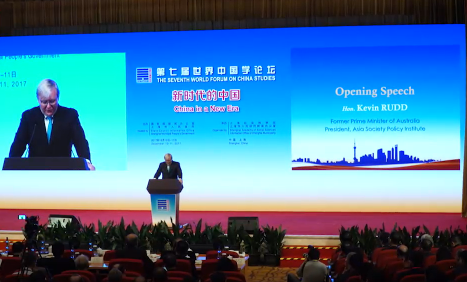China in new era examined from diverse angles
Author : LI YU, ZHA JIANGUO Source : Chinese Social Sciences Today 2017-12-25

The seventh World Forum on China Studies was held from Dec.10 to 11 in Shanghai under the theme "China in a New Era."
At the seventh World Forum on China Studies held from Dec. 10 to 11 in Shanghai, more than 180 experts and scholars from more than 10 countries and regions examined China in the new era from such perspectives as social governance, global governance and economic globalization.
Li Youmei, chairman of the Chinese Sociological Association, noted that the world faces new challenges in social governance.
While coping with rapid economic globalization, cultural diversification and information modernization, the Communist Party of China has established a social governance model based on collaboration, participation, and common interests, thus enriching human governance, Li said.
Lately, global governance has become increasingly unstable and uncertain. Chen Dongxiao, director of the Shanghai Institutes for International Studies, pointed out that global governance faces formidable tasks and complicated scenarios.
Growth through cooperation is a theme of human evolution. In the new era, the international community needs to reactivate the “cultural genes” of cooperation specific to mankind and promote the building of “a community of shared future,” especially establishing the identity and value goals shared by major countries, Chen said, adding that this is the only way to prevent global governance from falling into potential pitfalls.
Shedding light on globalization, Zhang Weiwei, head of the China Institute at Fudan University, said that as China actively participates in globalization, the people also benefit from it, which sharply contrasts with the situation in other countries.
Over the years, the West has confined globalization to the economic and political spheres, while China is vigorously implementing people-oriented reform and opening up, bringing an array of benefits to its people, Zhang said. The world can learn from China in this respect, particularly its emphasis on an economic and public service orientation within the international order and global organizations, he said.
“Economic globalization will continue in the future, but the model, including the driving force, connotation, scale, pace and structure, will undergo profound changes,” said Quan Heng, director of the Institute of World Economy at the Shanghai Academy of Social Sciences.
The China-proposed “Belt and Road” initiative will certainly advance the common development of China and countries around the world, ultimately helping restore and improve economic globalization, and build a fairer, more inclusive development mechanism, Quan said.
Wu Li, deputy director of the Institute of Contemporary China Studies at the Chinese Academy of Social Sciences, said that China, as a developing country with a socialist system, must accelerate innovation and carry out overall opening up in order to smoothly complete supply-side structural reform, transform the growth model and optimize the economic structure.
Now that a new round of industrialization is taking off, China should seize the historical opportunity to become a frontrunner rather than a follower and grow from a big manufacturer into a strong manufacturer, into a real power in science and technology and industry to contribute more to human development, Wu said.
The World Forum on China Studies was founded in 2004. It is jointly sponsored by the State Council Information Office and Shanghai Municipal People’s Government, and organized by the Shanghai Academy of Social Sciences and the Information Office of Shanghai Municipality. Since it was established, not only has it served as a major platform for global experts on China studies to exchange ideas, but it also provides an important window for the international community to observe and understand China.
Ye Shengtao made Chinese fairy tales from a wilderness
Ye Shengtao (1894–1988) created the first collection of fairy tales in the history of Chinese children’s literature...
-
How northern ethnicities integrated into Chinese nation
2023-09-18
-
Mogao caves
2023-09-12
-
Mogao Grottoes as ‘a place of pilgrimage’
2023-09-12
-
Time-honored architectural traditions in China
2023-08-29
-
Disentangling the civilizational evolution of China
2023-08-28
-
AI ethics in science fiction
2023-08-23














 2011-2013 by www.cssn.cn. All Rights Reserved
2011-2013 by www.cssn.cn. All Rights Reserved